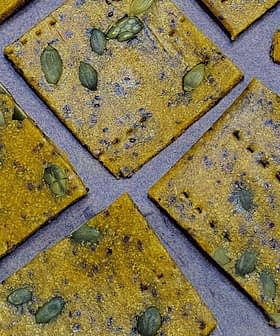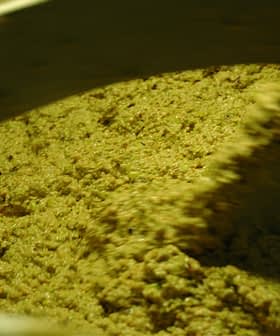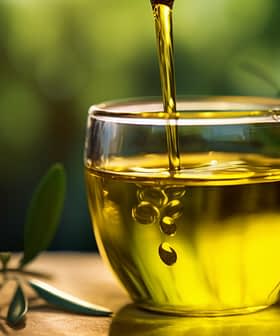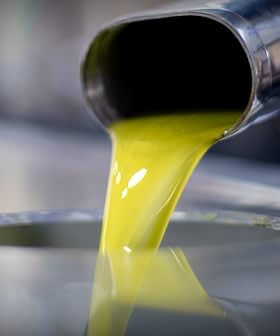Olive Oil Helps Reverse Damage of High-Fat Diets
Researchers in Chile found a compound in olive oil reduced the adverse effects on cholesterol and insulin caused by a high-fat diet.
A study conducted by researchers at the University of Chile found that adding a low dose of hydroxytyrosol, a compound in extra virgin olive oil, to a high-fat diet could reverse the negative health consequences associated with the diet, such as oxidative stress and signs of fatty liver disease. The study showed that mice on a high-fat diet supplemented with hydroxytyrosol had enzyme activity and fat composition in their organs comparable to those of mice on a regular diet, suggesting that the compound may be responsible for many of the cardiovascular benefits associated with olive oil.
While the cardiovascular benefits of extra virgin olive oil are well known, its mechanisms of action are cloaked in mystery to some extent. A new study provided enlightenment, as it showed a compound in the oil could reduce or reverse the negative health consequences of a high-fat diet.
Adding a relatively low dose of hydroxytyrosol was able to reverse oxidative stress, signs of fatty liver disease and negative effects seen in the other organs.
Because of the lack of knowledge about the properties by which olive oil works, researchers at the University of Chile set out to test the effects of a common constituent that is suspected to be responsible for its health advantages — the compound called hydroxytyrosol. They found it reversed markers of nonalcoholic fatty liver disease and insulin resistance in mice on a high-fat diet.
“Hydroxytyrosol is a polyphenol found in extra-virgin olive oil, which is known to have antioxidant properties and may play a key role in its health benefits,” said lead author Rodrigo Valenzuela.
The researchers wanted to ascertain the action of hydroxytyrosol on certain enzymes in the liver that are important in the synthesis of long-chain polyunsaturated fatty acids. Some of these acids are needed for vascular health. They discovered mice on a high-fat diet had lower activity of these enzymes, which was associated with an imbalance in the fat composition of the heart, liver and brain.
Yet when the high-fat diet of the mice was supplemented with hydroxytyrosol, the enzyme activity and fat composition of the organs were comparable to those of the mice fed the regular diet. In other words, the beneficial compound found in extra virgin olive oil seemed to reverse the two harmful effects.
“Our study found that mice fed on a high-fat diet had signs of non-alcoholic liver disease which we believe has led to the noticeable reduction in enzyme activity in the liver and the negative effects on fatty acid composition in this, and other, organs,” explained Valenzuela.
“We also found that the liver showed signs of increased oxidative stress, which we know has links to fatty liver disease. It is intriguing that adding a relatively low dose of hydroxytyrosol to the diet was able to reverse these effects, reduce the signs of fatty liver disease, and reduce negative effects seen in the other organs.”
In the research, groups of mice were fed either a 60 percent fat diet or a 10 percent fat diet. Each of these mice sets was subdivided into a group that was given hydroxytyrosol supplementation and a group that was not. The intervention period was 12 weeks. At the end of the study, blood and tissue samples were collected to measure enzyme activity and fatty acid composition in multiple organs.
Analysis of the blood tests showed increases in total cholesterol and LDL, or bad cholesterol, but no change in HDL, or good cholesterol, in mice fed the high-fat diet. The unhealthful effects on cholesterol were lessened markedly with the hydroxytyrosol supplementation.
The high-fat diet also raised markers of insulin resistance, an action that was decreased by the hydroxytyrosol. However, the compound didn’t reduce the markers to the levels found in the mice that were fed a regular diet.
These findings strengthen the evidence that hydroxytyrosol may underlie many of the health benefits of extra virgin olive oil, according to the researchers. The study was published in the journal Lipids in Health and Disease.
In an interview with Olive Oil Times, naturopathic candidate Rob Raponi explained that to receive the maximum benefit from hydroxytyrosol, it’s best to avoid overheating the oil.
“If someone is wanting to gain any benefit from this discovery it is important to ensure that olive oil is consumed raw (preferably) or lightly heated. If it’s heated past the smoke point, it begins to oxidize, an effect that reduces the amount of the hydroxytyrosol. My take-home message would then be to enjoy your olive oil, but take care not to destroy its delicate balance.”









